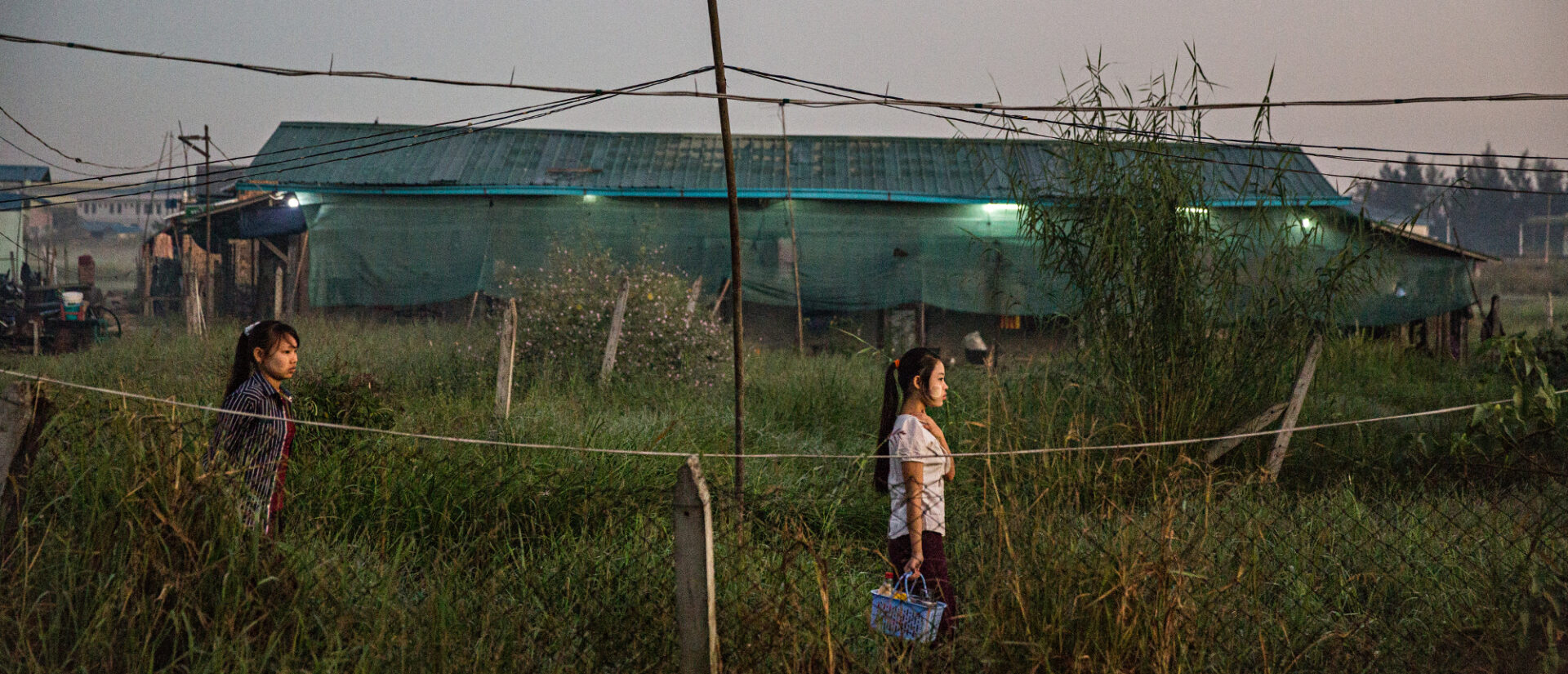
Towards a new normal
What must change in the Myanmar garment industry post-Corona crisis – a research into the labour conditions of two factories
The Corona virus has left a path of destruction through the Asian garment industry. Orders were cancelled, factories closed down, workers sent home and there have been huge financial losses. As a result, destitute workers have been left in incredible misery with severely decreased income or none at all, and hardly any support.
The Myanmar garment industry and its workers have not been spared. Here too, foreign buyers cancelled their orders, factories closed, and workers have been the ones to pay the price.
The world is eagerly awaiting the end of the crisis, for things to go back to normal. We should however realise that even before the Corona crisis broke out, the situation for garment workers in supply chains was far from ideal. On the contrary, before the Corona breakdown, workers had already been hard-hit. SOMO, as well as other organisations, have reported on deplorable sub-standard labour conditions in the export-oriented garment industry in Myanmar: depressingly low levels of unionisation, low wages and unlawful deductions, long working hours with excessive overtime, unpaid overtime, child labour, no employment contracts and a lack of grievance mechanisms.
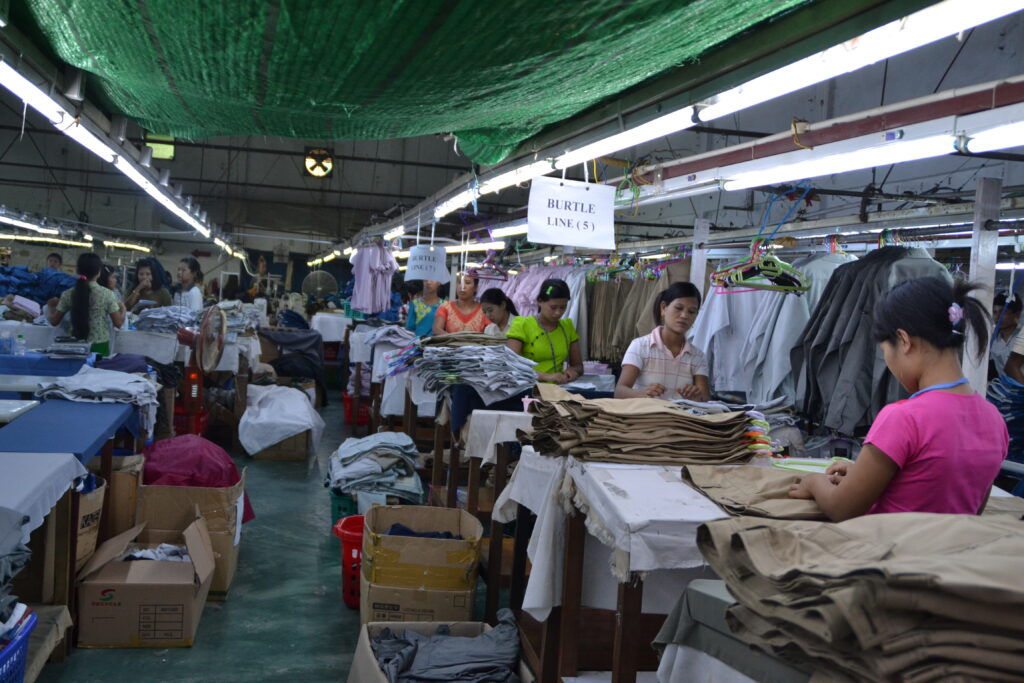 Photo: @Martje Theuws | SOMO
Photo: @Martje Theuws | SOMORecent field research done by SOMO in collaboration with a Myanmar-based labour rights group again shows how bad working conditions were .
In this article, data are presented on key labour issues in two garment factories, Leader One and Dong Yi. From intensive interviews with 39 workers, a grim picture of the pre-Corona crisis situation arises. Things cannot go back to the way they were. Let the Corona crisis be a turning point to finally improve the lives of workers in the garment supply chain, starting with these two factories in Myanmar.
| The interviews
For this current long read, 39 workers of Dong Yi and Leader One garment factories were interviewed, mostly women between 18-30, which reflects the overall age distribution of the garment labour force in Myanmar. Our local partner organised and conducted the indepth interviews between May 2019 and February 2020. The conversations were based on questionnaires with more than 50 questions on various key topics, ranging from personal data to employment contracts, payslips, wages, working hours, overtime, work load, bonuses, deductions, and the absence/presence of a trade union/or Worker Coordination Committee (WCC). To get an across-the-board-view of issues at the two factories, workers in different departments and functions were interviewed; cutters and sewers in the first place, but also people working in cleaning, computer design (CAD), ironing and quality control. |
Dong Yi and Leader One
Dong Yi and Leader One are foreign-owned garment factories. Both enterprises are member of the Myanmar Garment Manufacturers Association (MGMA). The factories produce for foreign brands, including , and . Main source for the information is the Open Apparel Registry (OAR)(opens in new window) where supplier lists of garment companies are uploaded. Interviewed workers also mentioned a number of other brands, but this we could not confirm with other sources.
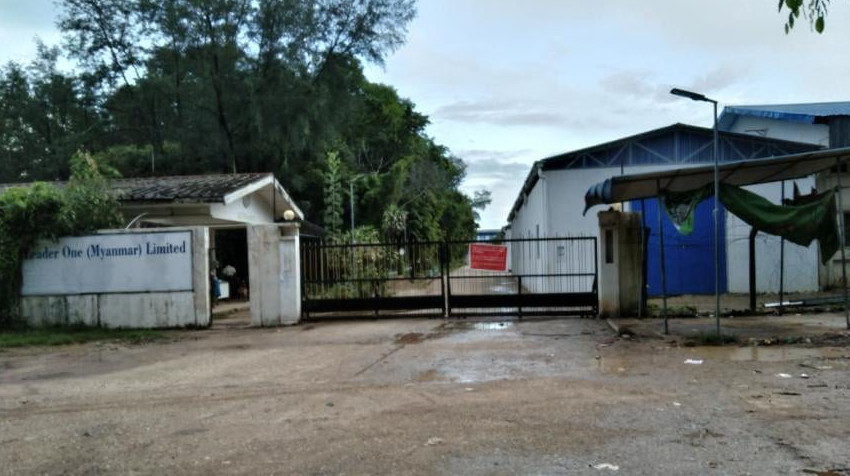
Tiresome paper work
When applying for a job. workers need to present a , which are difficult to obtain for workers. This stands in stark contrast to the documentary support provided by factory management: workers told us about . In some cases, workers were not allowed time to read the contract before they were made to sign it. It also became clear that contracts do not necessarily offer job security. In some cases, workers only signed a contract after having worked in the factory for three months.
Besides the problems with the contracts, there are problems with as well: vague procedures, nonexistent and incomprehensible payslips. In case of conflict, such as mass dismissal during the Corona crisis, workers need all documentary evidence to protect their employment position, or to negotiate payment of back wages or compensation.
Low wages and high hourly targets
Higher minimum wage in Myanmar: bad news for workers?
At both Dong Yi and Leader One, the basic monthly wage for most workers totalled to 144,000 MMK (€93.26). At first glance, one may think that the is respected at these . This would be so if a regular working day consisted of eight hours, but this is not the case. In order to reach , workers start earlier and shorten or skip their lunch and other breaks and regularly work extra hours unpaid overtime. This confirms again SOMO’s earlier analysis(opens in new window) , which showed how the increase of the minimum wage in May 2018 led to higher production targets imposed on workers.
Dong Yi worker: ‘If we don’t meet the target, we need to work unpaid overtime‘.
A take-home wage of 144,000 MMK (€93.25) is not enough to live on. All workers rely heavily on bonuses and overtime payments to get by. With these extras, the interviewed workers earned between 190,000 and 315,000 MMK/month ((€123.02 – 203.98). The majority of workers, however, earned 200,000 (€129.49) to 240,000 MMK (€155.39) per month.
Vague and excessive working hours
The concept of regular working hours is vague at the factories. There is no hard distinction between regular hours and .
‘We always have to work overtime, but overtime hours vary. Regular overtime is until 7pm or 8pm. However, we have to work longer when there is too much work to do.’
Working conditions are completely dictated by the flow of orders that the factory needs to produce. National or international standards with regard to maximum working hours do not apply. Lunch breaks, time to go to the bathroom, safe times and modes of transport for commuting workers are not relevant. Whether workers have children to look after or families to cook for – that is of no consequence. Free time, time to rest, to relax, to study, to exercise, to visit friends, etc. – this is a concept that is not part of garment workers’ lives.
Bonuses
Bonuses are an important part of the monthly take-home wages of workers. There are a variety of bonuses that workers can get: for the number of years worked in the factory; ; for reaching particular targets; , etc.
Worker: ‘I don’t think this system is fair. We do not know how much we earn per item. We are told only at the end of the month that we did not meet the targets even though we have worked very hard during the whole month. It leads to misunderstanding and creates problems.‘
‘They said we would be given a bonus if we were able to produce more garments. They did not not keep their promise though.‘
Workers also mentioned other types of bonuses, with cryptic descriptions, like ‘the other bonus of 5,000 MMK per month’; “the dozen bonus”; a bonus given by the buyers; bonuses given by supervisors” One worker told us that ‘If I finished eating quickly and got back to work earlier, the boss, a Chinese woman, would sometimes give me 5,000 MMK as pocket money.’ Some workers mentioned a bonus workers for Myanmar New Year.
Although bonuses are vital to earn an acceptable wage, workers do not necessarily have factual and precise information about the bonus system in place in their factory, or about what they are entitled to. In all, the bonus system has a very arbitrary character.
Deductions
The counterpart of the bonus system is a complex gamut of deductions. Workers at the two factories spoke of all kinds of deductions. Deductions are made for , , food provided in the factory and for the transport to and from the factory (more on this below).
The biggest issue clearly is that workers easily miss out on When workers are absent from work, harsh deductions are made. If a worker is absent from work for just one day, their full monthly attendance bonus is deducted. This is even the case when workers take leave they are legally entitled to. The system of deductions clearly appears to be arbitrary.
‘Deductions were made from my salary, but I don’t remember for what exactly.‘
Sanctions and degrading treatment
Even worse than the payment inequities is the picture of harsh and punitive management which arose from the interviews. Workers gave detailed information about the various sanctions (from dismissal to financial sanctions) that are applied by management or supervisors.
Workers have been fired for various reasons: making (small) mistakes or , being active in a union or calling for labour rights, having arguments with other workers or And even after workers are fired, they may still face .
In addition to the sanctions, workers suffer degrading treatment:
- Being scolded and shouted at by their supervisors;
- Being prohibited from using the toilet when production targets are not met;
- Being moved to another production line or unit if they refuse to work overtime;
- Not getting a social security card, even while contributions are deducted.
Leader One worker: ‘When workers are dismissed, it happens that management takes their .’
Worker representation
What can workers do when they have questions or concerns or when they face unjust treatment as described in this article? Unfortunately, but not surprisingly, there are no factory-level unions in these factories. This is very much in line with the overall situation in the Myanmar garment industry, which has an extremely low unionisation level.
Notably, workers generally do not know the difference between a union and a . Clearly, management does not make an effort to properly explain any of this to workers. Many of the interviewed workers were in fact unsure in their factory.
What we often heard is that workers were ‘still trying‘ to set up a union but that getting the union registered was a .
Overtime
This research shows clearly that overtime is part and parcel of workers’ working lives. All workers work overtime. Workers do not clearly distinguish between “normal” working hours and overtime, as overtime is standard practice. Workers have to work overtime all the time, whenever requested, but still so it is impossible for workers to keep track of the exact number of overtime hours worked over a certain period of time. Workers explained that following a month with public holidays, they have to work overtime for 3 weeks, to make up for the “lost” days.
It is not voluntary
There is no such thing as voluntary overtime. When asked for their reasons to work overtime, workers echoed management, speaking of orders and production targets that need to be met. When asked whether they like to work overtime, about half of the workers explicitly said no. Some workers said they do not like to work overtime, but they do it anyway because of the pay, which they desperately need or because they simply are . Other workers said they do not want to work overtime even despite overtime payments, because it is .
Management simply imposes overtime on workers. If management, supervisors, or line leaders do not agree with a worker’s request not to work overtime, the worker will just not be allowed to go home.
‘We have to sign a warning. We have been threatened that we will be fired next time we refuse to work overtime (Leader One).’
‘Usually the female clerk takes signatures from all of us to ensure that it is voluntary overtime. We know that we will be shouted at or scolded if we say no. Therefore we just work overtime whenever we are asked to do so (Leader One).’
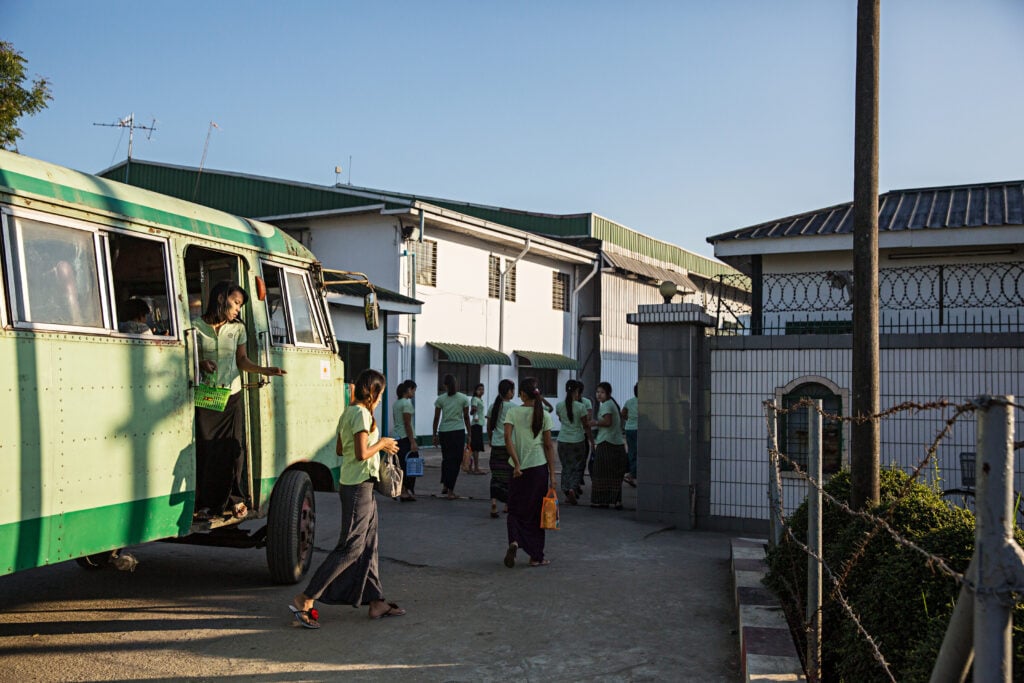
Transportation problems when working overtime
When workers have to work overtime, getting home is not so easy. Only when factory management orders workers to work overtime, do they arrange for a shuttle bus (“ferry”). When supervisors order overtime, which is often the case, no transport home is arranged. In any case, workers cannot get home . The workers who don’t have to work overtime face another problem: a ferry is only provided if there are enough workers to fill the ferry. So they have to wait until 11pm when the ferry has filled up.
In principle, the factory pays for the ferry, but workers have to advance the fare, which may amount to 500 MMK (€0.32) per person per trip. This creates problems for workers who do not have sufficient cash on them. Management only reimburses workers the following week.
In any case, the ferry only runs until 10pm, or 11pm at the latest. When workers have to work overtime beyond that time, they have to make their own more to get home. Sometimes this leads to .
If it gets really late, workers have to stay the night in dormitories, which are most . Such all-night overtime is announced a day in advance only. It seems to happen very regularly at both factories. Workers from the cutting and finishing units have to work the most overtime.
Hygiene at the factories
Interviewed workers also described issues with hygiene in the factories. The climate in Yangon is hot and humid throughout the year (with temperatures in summer reaching 45°C). Provision of fresh and clean water in the factory is a basic necessity, but several workers pointed out that the water supply is insufficient.
The picture that arises from the interviews is that workers are instrumental in completing orders, achieving targets and honouring shipment schedules. As workers said: ‘We are facing more difficulties when shipment time gets nearer‘. Do factory management have such awful planning skills? Or do they have no bargaining power with buyers who impose tight deadlines? Or is it both? Either way, these factory owners and their customers do not really care about the workers.
And then the Corona crisis hit Myanmar…
Because of the Corona crisis, the garment industry collapsed in Myanmar. Normally speaking, before Corona, there were 500 to 600 garment factories in Myanmar, employing some 700,000 mainly female workers. Many factories exported to international markets. Since Myanmar does not produce fabric or yarn, Cut Make Pack garment factories depended on the import of these essential goods, mainly from China(opens in new window) . When international trade flows dried up, at the beginning of the year, the Myanmar garment industry ran dry(opens in new window) too.
Starting in January, factories gradually closed. At first, they may have reduced the number of workers at facilities, but then they shut their doors entirely. Even before the cancellation of European orders(opens in new window) , 22 factories had closed down, leaving 10,000 workers unemployed. By early April, more than 40 factories had closed, resulting in the lay-off of more than 25,000 workers. The European Union(opens in new window) estimated that half of the Myanmar garment labour force, 350,000 people, were at great risk of either being suspended without pay or losing their jobs permanently(opens in new window) .
| The Myan Ku fund
To support the thousands of Myanmar garment workers who lost their jobs due to the Corona pandemic, the European Union has created a €5 million emergency cash fund(opens in new window) named “Myan Ku”. This EU fund is expected to reach around 90,000 workers. On the 1st of May, International Workers Day, the first payments(opens in new window) were transferred.Immediately after the EU announced the creation of the fund, an ad hoc alliance of Myanmar labour groups came out with a strong statement, detailing the specific needs of different . |
Thingyan, the Burmese New Year, was celebrated from 10 to 20 April. Traditionally, factories close then and workers enjoy a well-deserved holiday. Just before the end of the Water Festival holiday, in the weekend of 18-19 April, the government ordered all garment factories to close (or remain closed) until 30 April. The Ministry of Health and Sport and the Ministry of Labour directed factory owners to use the 10-day period to take measures in their facilities to prevent the spread of the Corona virus. The Myanmar Garment Manufacturers Association (MGMA) advised its member companies to send their workers on unpaid leave from 20 to 30 April.
Now, things are slowly picking up again. Factories reopened after 30 April. But not all factories have opened, and many still only are operating at only half or even less than half capacity, meaning that workers work fewer hours. In combination with the fact that take-home wages have tumbled since March, this means that garment workers in general are suffering a major loss of income.
| Leader One and Dong Yi factories during Corona crisis
Leader One did not close in March: garment production continued. Only at the start of the Water Festival, 10 April, was the factory shut down. Just before the Water Festival holidays, management reportedly told the workers that if they went home to their villages, they need not come back after the holidays. Some 20 workers were made to sign their agreement with this arrangement and lost their jobs. Our partner has rightly labeled this as forced dismissal. Leader One reopened on 27 April. To the best of our knowledge, no Corona inspection has taken place, so far. Management announced to the workers that inspections would take place on 11 June, but these did not materialise. Although no more workers have been laid off or suspended since reopening, management did warn that they have a plan ready to get rid of workers who fail to meet the production targets. The Dong Yi Factory closed on 3 April, a week before the Water Festival, and reopened on 2 May. As at Leader One, The Dong Yi management announced just before the festival that any worker who took leave need not come back after the holidays. Entitled to leave and in the midst of the corona pandemic, of course many workers did return to their home villages even if that meant they had to sign a resignation letter. Approximately 50 Dong Yi workers lost their jobs in this manner. |
There is another effect of the Corona crisis – Myanmar’s young and vulnerable trade union movement is . Under the guise of steps necessitated by the Corona crisis, selective dismissals of union leaders and members are taking place. In this way, factory owners seek to undermine the worker rights movement(opens in new window) in Myanmar. In the past months, factory-level unions have spoken out about unsafe working conditions in relation to the Corona crisis and unpaid wages. In the same period, a disproportionate number of union members have been laid off.
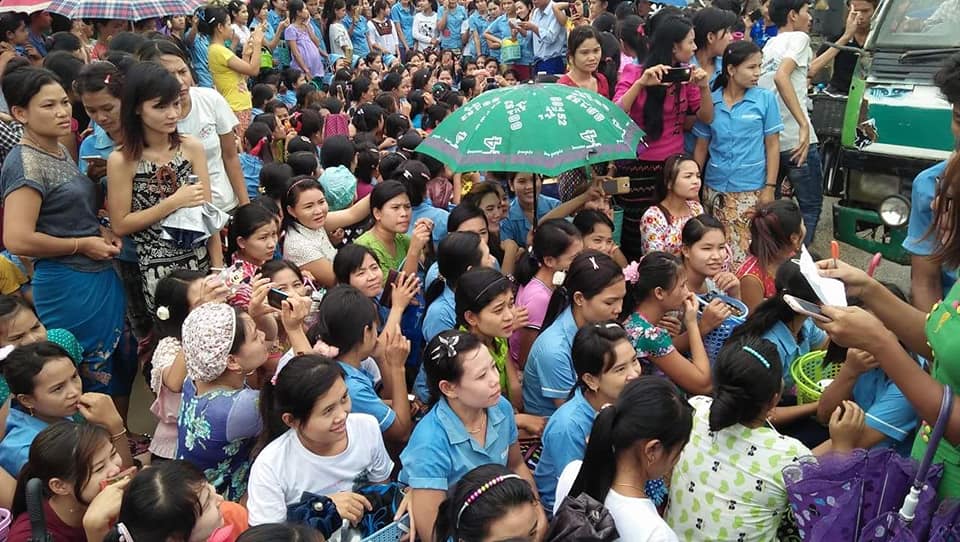
Workers protesting in Myanmar
What is needed now?
The Corona crisis is having a huge impact on the global garment industry and a disastrous effect on the living and working conditions of workers in particular. Globally, garment workers were getting poverty wages, far from living wages. Now, many of them do not even have that.
Companies, including the brands mentioned in this article, have benefitted from the exploitative system. This comes with a responsibility. Urgent and collaborative action is needed among all actors in the global garment industry to ensure garment workers’ wages are paid. Clean Clothes Campaign has elaborated the urging apparel companies to publicly assure that all workers in their supply chain will be paid during this crisis. SOMO is co-signatory of this powerful call for action.
Systemic change is needed
In the long run, we cannot go back to the pre-Corona situation in which workers always pull the short straw. Structural, systemic change is needed.
Key elements are:
- There is a power imbalance between buying companies and suppliers. Buyers push costs and burdens onto suppliers while claiming a disproportionate share of the gains made along the value chain. This must be addressed;
- The prices that buying companies pay to supplier factories for their products should reflect the true cost of labour, including decent wages for workers involved in making the products. Wages should allow workers to cover their basic needs, including medical care, insurances, and savings. Prices paid to factories should enable manufacturers to maintain financial reserves that allow them to pay out all benefits that workers who are terminated are entitled to;
- Whereas workers hardly have a voice now, they must be given a central role in monitoring and improving working conditions in supplier factories;
- Brands and retailers can hardly be held accountable for not respecting labour rights on the basis of the voluntary brand labour standards that now apply. Workers and unions cannot enforce labour rights standards. Legally mandatory human rights due diligence should change this. An important feature of such desired HRDD legislation is the right of persons to claim compensation for harm inflicted by companies that breach human rights.
Only this way, decent garment production in Myanmar is possible.
Related news
-
 The hidden human costs linked to global supply chains in ChinaPosted in category:News
The hidden human costs linked to global supply chains in ChinaPosted in category:News Joshua RosenzweigPublished on:
Joshua RosenzweigPublished on: -
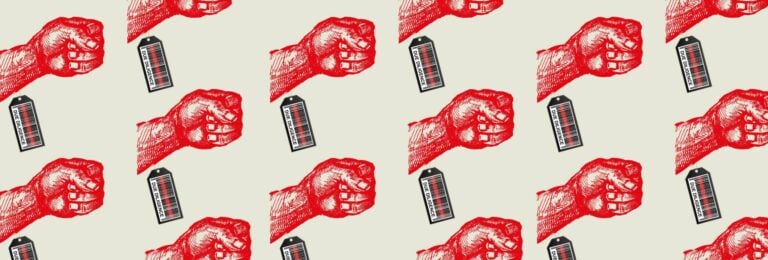 Major brands sourcing from China lack public policies on responsible exitPosted in category:News
Major brands sourcing from China lack public policies on responsible exitPosted in category:News Joshua RosenzweigPublished on:
Joshua RosenzweigPublished on: -
Linking labour issues in China to global brands Published on:Posted in category:Publication




